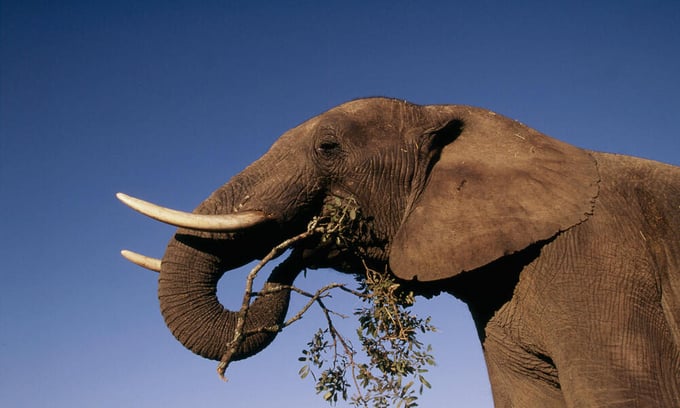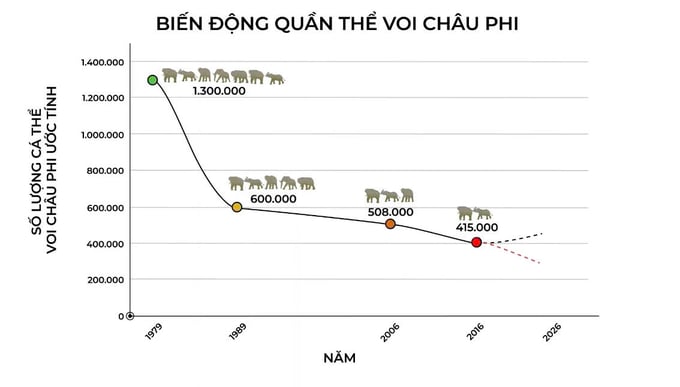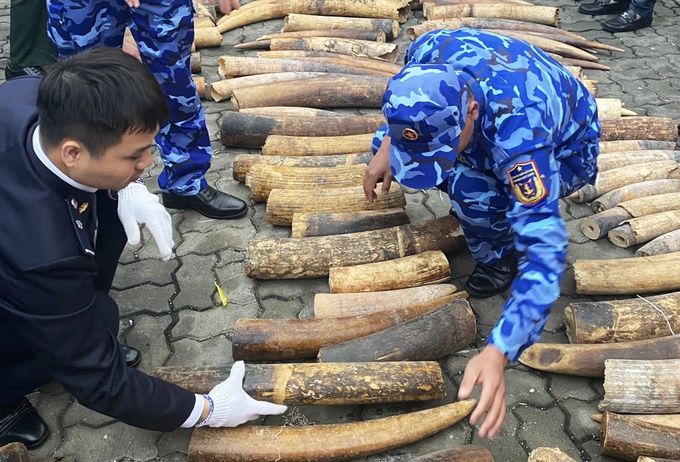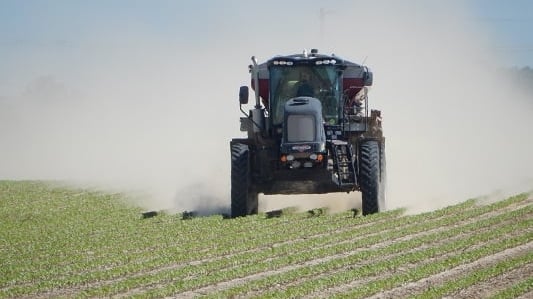May 17, 2025 | 16:00 GMT +7
May 17, 2025 | 16:00 GMT +7
Hotline: 0913.378.918
May 17, 2025 | 16:00 GMT +7
Hotline: 0913.378.918
In the natural world, elephants are a critical species that contributes significantly to the preservation of biological diversity and ecological balance in the region. The process of consuming food aids in the dispersion of seeds, thereby establishing favorable conditions for the sowing of multiple plants. Around one third of the the plants in the African forest depend on the elephant to disperse the seeds.
Elephant’s wastes, in addition, hold a great amount of nutrients, attracting insects such as butterfllies and flies which later become the food source for other reptiles and birds.

The decline in elephant populations will contribute to global warming, with many unpredictable consequences for human life. Photo: Martin Harvey/WWF.
The consumption demands persist, and the trading persists during tourist trips to Vietnam, Cambodia, and Thailand, among other countries, despite the prohibition of trading, transporting, and using elephant ivory products by numerous countries.
Elephants are capable of effortlessly locating subterranean water and mineral sources that are located beyond the soil layers. Additionally, they can assist in the search for other species that require these essential nutrient resources.
This mamal also fulfills the function of an "engineer" for the ecosystem. These trailers would facilitate the hunting, escaping, and water seeking of other creatures when they flattened the trees to construct their trails.
The elephant's overthrow of the tall trees in Afica contributes to the preservation of the steppe environment, thereby facilitating the development of new shoots.
The movement of elephants in the forest aids in the reduction of low-layer plants, thereby conserving water, nutrients, and light for larger plants with a greater capacity to assimilate carbon.
The reduction of the elephant population and the effects of global warming have resulted in a variety of unpredictable consequences for human life. As per the World Wildlife Fund (WWF), the elephant, which is considered a "climate hero," would enhance the forest's carbon absorbance capacity by eliminating the emissions of 2,047 cars in a single year.
Thibault Ledecq, the Chief Conservation Officer of WWF-Vietnam, stated that the current harsh situation on Earth is a result of the negative activities against nature. Pollution, droughts, floods, biodiversity loss, and the extinction of untamed animal and plant species have evolved into global crises, which have significantly disrupted the ecological balance.
The 2024 Living Planet Report by WWF indicates that vertebrate populations have plummeted by an average of approximately 73% globally over the past 50 years (1970-2020). Freshwater populations have experienced the most severe decline, with a nearly 85% reduction. Terrestrial populations have experienced an approximately 69% reduction, while marine populations have received a 56% reduction.

Source: WWF - Vietnam.
WWF also reports that approximately two-thirds of ocean environments and three-quarters of terrestrial environments have experienced substantial alterations. The degradation of biodiversity has had and continues to have grievous impacts on the quality of life, health, food security, and livelihoods, exposing humanity to unforeseen risks.
Elephants are confronting the most severe situation and are at an extremely high risk of extinction, while endangered, rare, and valuable wildlife species are in continuous decline. According to estimates, the African elephant population has decreased from 1.3 million individuals in 1979 to a mere 415,000 in 2016. A mere 50,000 Asian elephants are believed to persist in the wild. The WWF - Vietnam Conservation Director underscored that "illegal elephant poaching is one of the primary causes of the severe decline in wild elephant populations."
From 2008 to 2018, the World Wildlife Fund (WWF) reported that at least 20,000 African elephants were murdered annually for their ivory. Between 2008 and 2016, the Elephant Trade Information System (ETIS) documented a total of approximately 463,000 kg of seized ivory on a global scale. Elephants may go extinct in the near future if the current rate of decline continues.
"Many forests will no longer be tranquil, and numerous companion species will lose their refuge due to the absence of elephants." The irreplaceable void in nature is the result of the disappearance of elephants and other uncommon wildlife in forests. Other ecological activities within the forest are also experiencing a decline, which is resulting in the slowing down or even end of the processes of regeneration and development. Mr. Ledecq expressed his concern about this.
According to Mr. Vuong Ngoc Chien, the Project Manager of the "Reducing Demand for Elephant Ivory" initiative at WWF - Vietnam, the illegal wildlife trade is one of the four largest illegal businesses in the world, with an estimated 21 billion USD in annual illegal profits. One of the main commodities in this illegal supply chain is ivory.
The destinations for 90% of the total volume of African ivory seized globally are Southeast Asian countries and China. Vietnam, in particular, is regarded as a significant transit center in this supply chain, as it was the location of the world's largest ivory smuggling seizure in 2019 and accounted for 34% of the total detected imported ivory.

Authorities counted the amount of ivory smuggled into Hai Phong port in February 2023. Photo: Hai Phong Customs Department.
Ivory products that are produced in Vietnam are subsequently transported to critical consumer markets, including the United States and China. In addition, certain products are sold domestically through a variety of methods, such as online trading, to reach both local consumers and international tourists.
Mr. Ledecq also observed that the number of illegal ivory trafficking cases into Vietnam has not decreased, as per statistics.
Similar to this, in early 2023 and 2024, authorities discovered four consecutive cases, confiscating a total of over eight tons of ivory. Between 2009 and 2019, Vietnam confiscated more than 70 tons of illegally transported ivory, making it the country with the most recorded ivory seizures in Southeast Asia, according to ETIS data.
Elephants are protected by Vietnamese law to the fullest. The trading, transporting, warehousing, processing, or advertising of elephant products, particularly ivory, are considered legal violations. According to the 2015 Penal Code, which was amended in 2017, violators may be subject to penalties of up to 15 billion VND and imprisonment for a maximum of 15 years.
* 1 USD is equivalent to 25,520.00 VND.
Translated by Linh Linh

(VAN) Hue City rigorously enforces regulations regarding marine fishing and resource exploitation, with a particular emphasis on the monitoring of fishing vessels to prevent illegal, unreported, and unregulated (IUU) fishing.

(VAN) Hanoi People's Committee has issued a plan on reducing greenhouse gas emissions in the waste management sector with 2030 vision.

(VAN) Vietnam's draft amendment to Decree No. 156 proposes a mechanism for medicinal herb farming under forest canopies, linking economic development to population retention and the sustainable protection and development of forests.

(VAN) In reality, many craft village models combined with tourism in Son La have proven effective, bringing significant economic benefits to rural communities.

(VAN) The international conference titled Carbon Market: International experiences and recommendations for Vietnam was successfully held recently in Ho Chi Minh City.

(VAN) According to the Project on rearranging provincial and communal administrative units, in 2025, the country will have 34 provinces/cities, 3,321 communes, wards, and special zones, and no district-level organization.

(VAN) The vice president of fertilizer with Stone X Group says the Trump administration’s tariffs are impacting fertilizer markets.